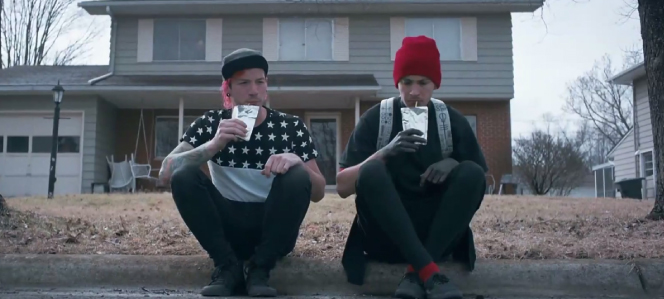The music video for the catchy, but now overplayed song, “Stressed Out,” begins with a disaffected Tyler Joseph, the vocalist for the band Twenty One Pilots, pedaling a tricycle on a vacant, wintered street. Black paint, the color of soot, creeps up his neck and covers his hands. His weary face sits below a red beanie socked on his head. A hypnotic, brooding beat drops in and he starts singing, “I wish I found some better sounds no one’s ever heard/ I wish I had a better voice that sang some better words/ I wish I found some chords in an order that is new.” The litany of “wishes” makes way for the honest, tragic sentiment threaded throughout the entire song: “But now I’m insecure, and I care what people think.”
When Megan Garber, a writer for The Atlantic, first heard the song stuck in traffic she labeled it a “Millennial anthem,” the battle cry (or is it sigh?) for this generation’s worried, jaded and stressed out youth. It may explain why the song has garnered such popularity, peaking at the number two spot in the Billboard Top 100. This angsty, talented and culturally aware duo from Columbus, Ohio struck a chord, or several of them, with a nation of young adults.
As honest as it is, though, it doesn’t offer anything revelatory. A Huffington Post article, “American Teens Are Even More Stressed Than Adults,” detailed how the American Psychological Association’s Stress in America survey found Millennials (aged 18-33) to be the country’s most-stressed generation back in 2013 (although the article goes on to explain how teenagers assumed the top spot the next year). Generally speaking, Americans are more stressed out than they were decades ago, despite the technological, medical and societal improvements since. So the question remains: why are we so stressed out?
Some reasons include the rise of financial uncertainty, faulty healthcare, domestic terrorism and so on. However, it’s interesting that this increase in national stress levels coincides with the decrease in those, especially among Millennials, ascribing to some type of church or solid religious foundation. In the words of the Catholic writer, Walker Percy, it seems many of us have caught the “malaise.” But it’s a bit different than Percy’s malaise of the second half of the last century; this one is fraught with worry and anxiety. Many today know there is something wrong, evidenced by the increased lamentation for a better time—a heralding of nostalgia as an incompetent savior.
After the initial opening scene, we see the band members in a Midwest living room redolent of the nineties with the words, rather ironically, “Faith, Family and Friends” framed in the background. Then we catch sight of the duo sitting on a curb, knees at their chests, sipping silver Capri Suns. Like the entire video, there is a vain attempt to capture whatever it was—optimism, hope, faith? —that has been lost over time, as if the repetition of childhood rituals can “turn back time to the good old days.”
Whereas 2,000 years ago, Jesus warned us not to worry about tomorrow, today he would need to add, not to long for yesterday, either.
This longing is quite widespread, manifesting in the form of t-shirts with retro movie quotes or ringtones conjuring scratchy riffs of early nineties grunge bands. The past can afford a type of escape, a mutual sharing of an idealized version of our younger selves that acts to distract us from the worry and uncertainty of the future. There is something about childhood that we recognize as sacred, whether we can give voice to it or not. We yearn for that innocence, back when we played in tree houses, dreamed of going to outer space and had our mothers sing us to sleep.
Although the song no doubt romanticizes childhood, at its core it speaks to a pining for a time of simplicity, security, and play. It’s not that we shouldn’t reclaim these childish qualities—we should, as our entrance into the Kingdom depends on it—but rather that we can’t live in fear, hoping for an idealized past to somehow save us from our present reality. Near the end of the music video, the band members’ parents and siblings, donned in funeral black, scream “wake up, you need to make money!” Yes, we will need to pay bills. Yes, we will need to get a job. Yes, we will need to make money.
However, if we are confronted with the grave ultimatum of only making money—which it seems many Millennials are these days—then it’s no wonder the two band members remain in a state of fruitless regression. At the video’s end, we see Joseph with red eyes, snarling at us as he repeats the command to wake up and make money. The anger and despair in his face might reflect more than Millennial unrest, but also a society that has ceased being awake for the right reasons. The voices are right in that we need to wake up, engage our present reality and take responsibility for our lives. But that’s not the only reason for waking up, thank God. The real reason for waking up is so that we, with childlike faith and hope, can lead meaningful lives of love and service.
Unless we realize that the good old days aren’t gone for good, but are attainable both now and in the future, then I worry Millennials—along with everyone else—will continue to be anxious, disenchanted, and, well, stressed out.
